
Version 3 of the Scala programming language includes the latest research in type theory and many new features such as new “quiet” syntax for control structures like ‘if’, ‘while’, and ‘for’; optional braces for an indentation sensitive style of programming ;and much more.
The Scala programming language combines object-oriented and functional programming in one concise, high-level language.
One major change in the new version concerns macros in which the metaprogramming API of Scala 3 is designed to gradually support different levels of use cases, according to the team.
Additional details on Scala 3 are available here.
Python Extension May 2021 release for VS Code
The May 2021 Python Extension for Visual Studio Code is now available and it loads much faster and more reliably than previous versions due to a major improvement on the Python environments discovery mechanism.
Pylance is now the default language server for Python and is included with the Python extension as of this release.
“This upgrade provides what we believe is the most performant and user-friendly Python editing experience for Visual Studio Code ever,” Savannah Ostrowski, the program manager of Pylance (Python Language Server) and Python in Visual Studio wrote in a blog post.
ArmorCode emerges from stealth
ArmorCode announced that it secured $3 million in seed financing and unveiled its next-gen application security platform.
The new platform focuses on application security posture management to simplify AppSec operations with a centralized view of security findings across application and infrastructure security.
It also includes a DevSecOps workflow and over 60 integrations with AppSec, CI/CD, collaboration, and infrastructure security tools, as well as out-of-the box compliances with many security standards.
Azul expands product portfolio
The Java platform Azul announced new products and pricing for customers and partners.
The platform includes the new Azul Intelligence Cloud which improves visibility, management, security, stability, efficiency, optimization and operational intelligence across entire Java estates.
Also, the new pricing model is based on virtual cores and desktops to accommodate various customer deployment scenarios.
“When companies adopt the Azul Platform based on OpenJDK, they dramatically reduce their Java infrastructure and support costs, improve application performance, and enable development teams to focus on innovation rather than troubleshooting,” said Scott Sellers, the co-founder, president and CEO of Azul.
Additional details are available here.






